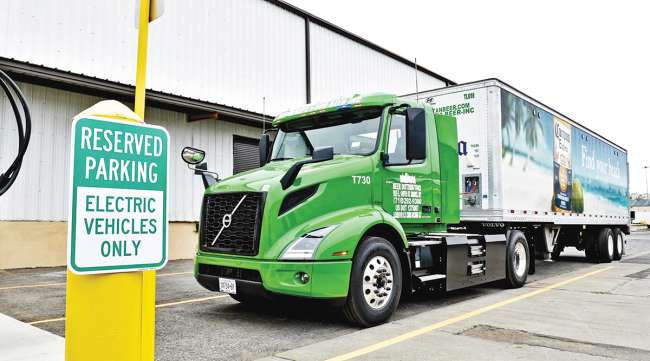Senior Reporter
Volvo Group Reports Higher Revenue, Record Q1 Deliveries

[Stay on top of transportation news: Get TTNews in your inbox.]
Volvo Group reported first-quarter net income slipped and revenue increased amid what the company referred to as good economic activity, high transport volumes and solid construction activity while order backlogs are extended and lead times long.
Truck deliveries set a record for a first quarter, rising to 55,588 compared with 52,444 a year earlier.
“With transport activity across most regions on good levels, demand for trucks is high. We have large order books and delivery times are long, and this has made us restrictive with order slotting, which affected order intake negatively. We are doing everything we can to reduce the long lead times to our customers. The supply chain continued to be strained, which caused disturbances and stoppages in production also in Q1,” CEO Martin Lundstedt said in a release.
Volvo, which reports in Swedish krona, posted the equivalent net income of $732 million, or 34.2 cents per diluted share, compared with $942 million, 45.5 cents, in the 2021 period.
Revenue climbed to $11 billion compared with $9.83 billion a year earlier.
Of that revenue, $7.2 billion came from truck sales, compared with $6.1 billion a year earlier.
Truck sales in North America increased to $3.1 billion compared with $2.5 billion a year earlier.
Volvo Group North America brands include Mack Trucks and Volvo Trucks North America.

Lundstedt
“The high business activity combined with our growing service contract portfolio resulted in continued good service growth, which was up by 19%. We achieved an adjusted operating margin of 12% compared with 12.6% a year earlier despite a challenging supply chain situation,” Lundstedt said.
Volvo notched extra costs due to the supply chain disruptions as well as higher costs for material, and worked proactively with “price management to mitigate them,” he said. “We expect that the inflationary pressure will continue.”
In Europe, Volvo’s largest market, sales rose 25% to $4.8 billion compared with $3.9 billion in the 2021 period.
In all, vehicle sales increased to $8.4 billion compared with $7 billion a year earlier.
Meanwhile, net orders for trucks dropped to 45,594 compared with 85,461 a year earlier.
Order intake in North America decreased by 73% to 6,017 trucks while deliveries increased by 7% to 13,908 vehicles.
VTNA’s heavy-duty truck market share decreased to 9.8% from 10.3% and Mack Trucks’ market share decreased to 5.3% from 6.6% in the 2021 period.
Volvo noted demand for electric trucks is gradually gaining traction in city distribution and regional haul.
In March, Volvo Trucks North America received an order for 110 Volvo VNR Electric trucks from the global logistics company Maersk. The deal adds to a previous order of 16 trucks of the same model and marks the single-largest commercial order to date for Volvo’s electric trucks.
It is clear, he said, that its customers and their customers are really beginning to push for a transition into electric vehicles and machines to decarbonize their value chains.
Want more news? Listen to today's daily briefing above or go here for more info
“This is a development that will only accelerate,” Lundstedt said. “And we continue to accelerate our investments to roll out even more electric products and solutions in the near future.”
Regarding the war in Ukraine, Lundstedt said since the war with Russia started and sanctions were imposed, all sales, services and production in Russia have been suspended.
“We have total assets of approximately $940 million related to Russia, of which $429 million were provisioned for in Q1 with a negative impact on operating income,” he said.
Out of that $940 million, some $628 million is “cash-items mainly related to the financial services business where we have financed the customers purchases of trucks and machines. The remaining three would be real estate, spare part stocks etc.,” Claes Eliasson, senior vice president of media relations at Volvo Group, wrote in an email to Transport Topics.
“The cash-items are mainly loans we have taken and bonds we have issued to fund our credit portfolio,” he wrote. “As these loans and bonds mature over the next coming years, we have to repay the money, even if our customers are not able to pay their lease payments to us. The maturities in the funding and lending in the credit portfolio is matched.”

